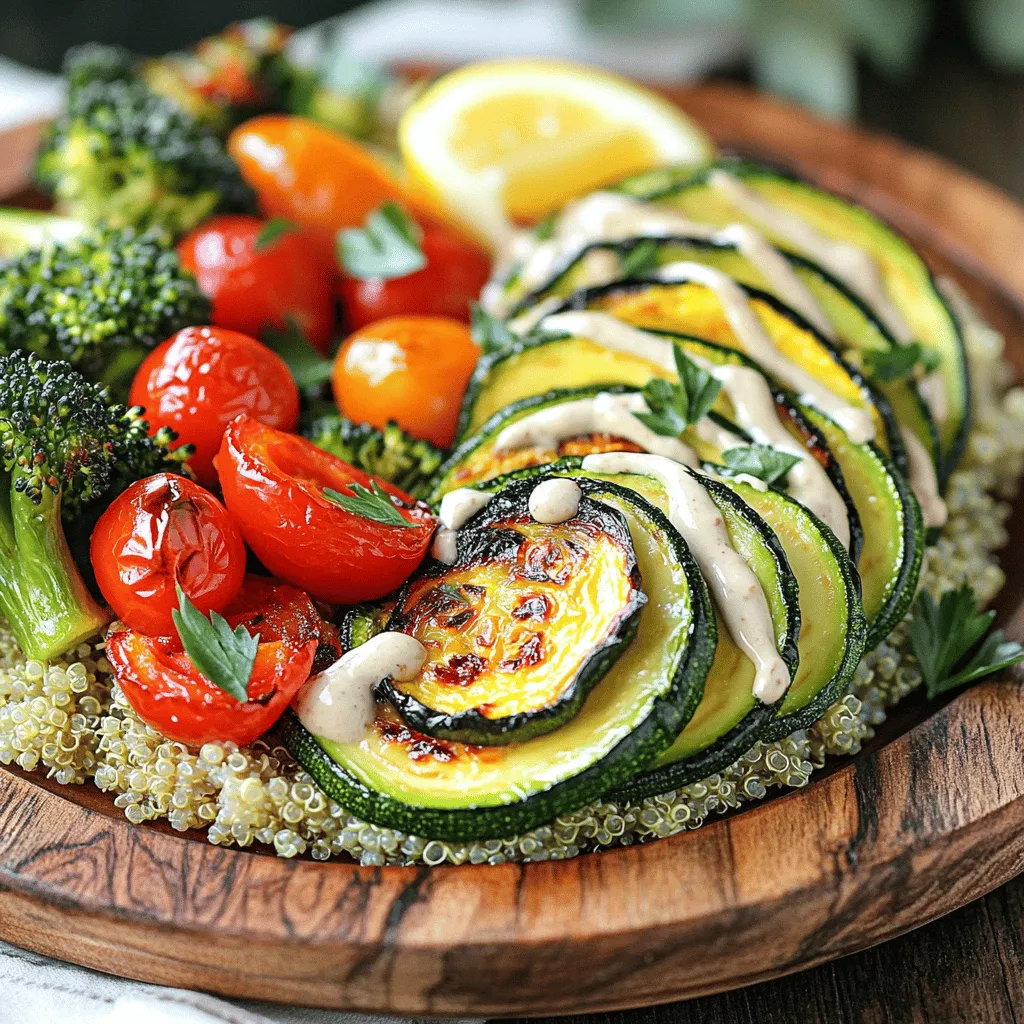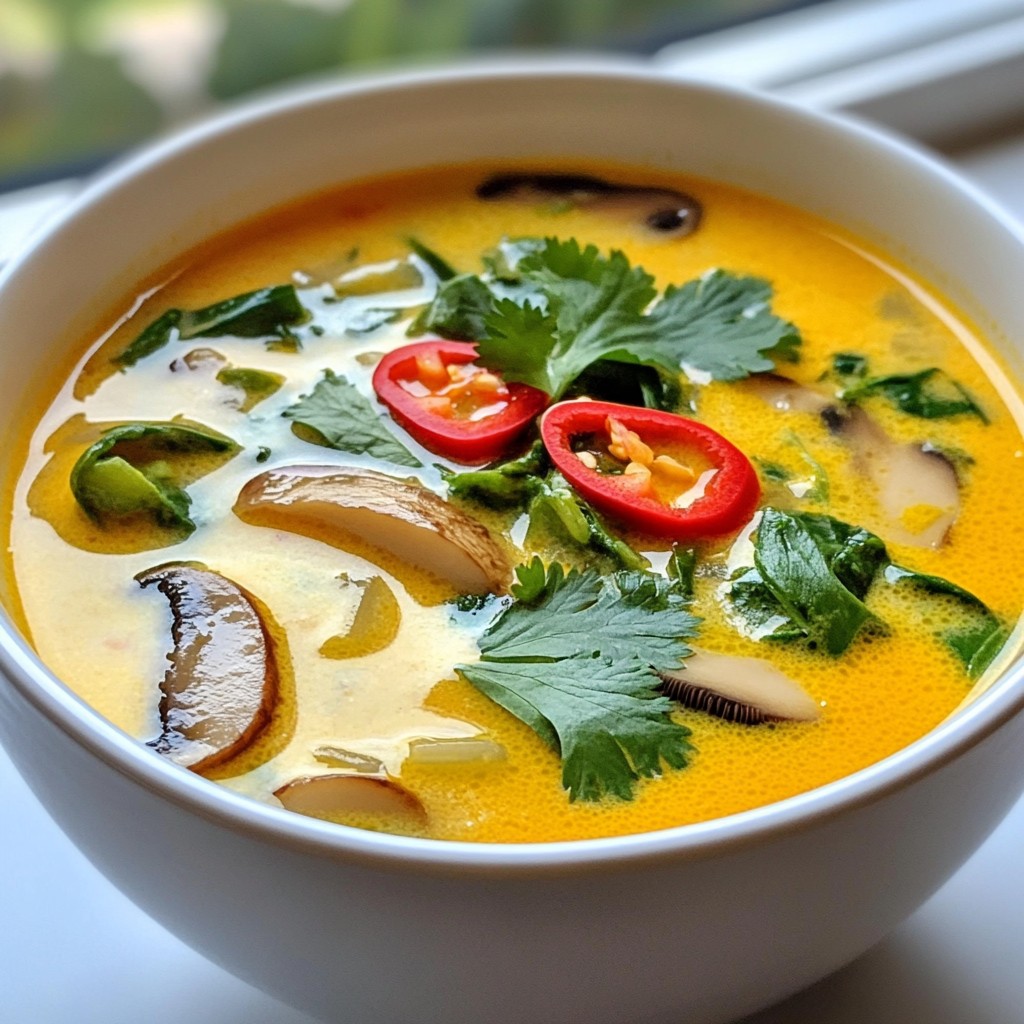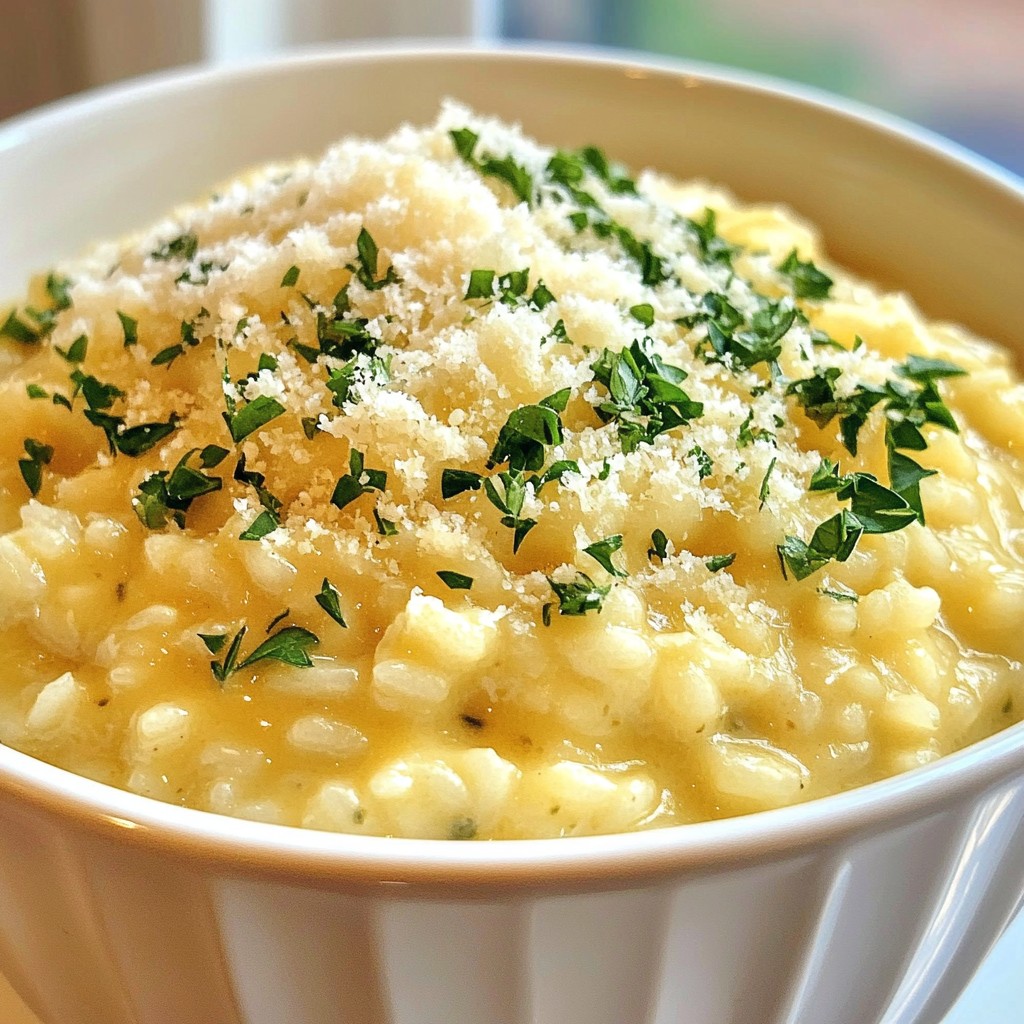Are you ready to create a dish that’s both flavorful and healthy? Roasted Veggie Grain Bowls are your answer! These colorful bowls combine fresh vegetables, wholesome grains, and a creamy tahini sauce that will make your taste buds dance. In this post, I’ll walk you through the ingredients, steps, and tips to make the perfect bowl. Let’s bring vibrant flavors to your table in just a few easy steps!
Ingredients
Complete List of Ingredients
To make tasty roasted veggie grain bowls, gather these items:
– 1 cup quinoa, thoroughly rinsed
– 2 cups vegetable broth
– 1 zucchini, diced into bite-sized pieces
– 1 red bell pepper, diced
– 1 cup cherry tomatoes, halved
– 1 cup broccoli florets, cut into small pieces
– 2 tablespoons olive oil
– 1 teaspoon garlic powder
– 1 teaspoon smoked paprika
– Salt and freshly cracked black pepper, to taste
– 1 avocado, halved and sliced
– ¼ cup tahini
– 2 tablespoons freshly squeezed lemon juice
– Fresh herbs (such as parsley or cilantro) for garnish
Key Considerations for Freshness
Fresh ingredients make a big difference. Choose bright, firm veggies for the best flavor.
Here are some tips to ensure freshness:
– Look for vibrant colors: Fresh veggies should be bright and appealing.
– Check for firmness: Avoid soft or wrinkled produce.
– Buy local when possible: Seasonal veggies taste better and last longer.
Suggested Ingredient Substitutions
You can swap some ingredients based on your taste or what you have. Here are easy swaps:
– Quinoa: Use farro, rice, or barley instead.
– Veggies: Try carrots, asparagus, or sweet potatoes.
– Tahini: Substitute with yogurt or nut butter for a different sauce.
– Herbs: Use basil, dill, or chives for fresh flavor.
Explore these options to make your roasted veggie grain bowls unique!
Step-by-Step Instructions
Prepping the Oven and Quinoa
Start by preheating your oven to 425°F (220°C). This heat is perfect for roasting. While the oven warms, prepare the quinoa. In a medium saucepan, bring 2 cups of vegetable broth to a boil. Once boiling, add 1 cup of rinsed quinoa. Lower the heat, cover, and let it simmer for about 15 minutes. The quinoa will soak up the broth and become fluffy. After cooking, let it rest for 5 minutes. Fluff it with a fork before serving.
Roasting the Vegetables to Perfection
While the quinoa cooks, prepare your veggies. Grab a large baking sheet and add the diced zucchini, red bell pepper, halved cherry tomatoes, and broccoli florets. Drizzle 2 tablespoons of olive oil over these veggies. Then, sprinkle 1 teaspoon of garlic powder, 1 teaspoon of smoked paprika, salt, and freshly cracked black pepper. Mix everything well to coat the veggies. Place the baking sheet in the oven and roast for 20-25 minutes. Halfway through, stir the veggies to ensure even cooking. They are done when tender and slightly caramelized.
Creating the Tahini Sauce
For the tahini sauce, combine ¼ cup of tahini and 2 tablespoons of freshly squeezed lemon juice in a small bowl. Whisk them together until smooth. Add a pinch of salt for flavor. If the sauce seems too thick, thin it out with a little water. Adjust it until you reach your desired consistency.
Tips & Tricks
Common Mistakes to Avoid
When making roasted veggie grain bowls, avoid overcooking your vegetables. They should be tender but not mushy. Also, don’t skip the seasoning. A little salt and pepper make a big difference. Lastly, ensure the quinoa is fluffed well after cooking. This helps the grains mix nicely with the veggies.
How to Enhance Flavor and Texture
To boost flavor, try marinating the veggies in olive oil and spices before roasting. You can add herbs like thyme or rosemary for a fresh taste. For texture, consider adding nuts or seeds. Toasted sunflower seeds or crunchy almonds add a nice bite.
Serving Suggestions for a Balanced Meal
Roasted veggie grain bowls are great for a filling meal. Pair them with a side salad for more greens. You can also add a protein like grilled chicken or chickpeas for extra nutrition. For a wow factor, drizzle more tahini sauce on top or sprinkle with feta cheese.

Variations
Alternative Grains to Experiment With
You can switch up the grains in your bowl. Try brown rice, farro, or barley. Each grain brings a different taste and texture. Quinoa is great, but experimenting keeps it fun. You can also use millet for a unique twist. These grains offer more fiber and nutrients. Explore different cooking times for each grain to get them just right.
Seasonal Vegetable Options
Seasonal veggies make your grain bowl fresh and vibrant. In spring, use asparagus and peas. Summer calls for corn and eggplant. Fall brings sweet potatoes and kale. In winter, think about Brussels sprouts and root vegetables. Each season gives you new flavors and colors. Using fresh, local produce can boost taste and nutrition.
Flavorful Additions and Toppings
Toppings can elevate your bowl. Consider adding nuts or seeds for crunch. Roasted chickpeas add protein and flavor. You might also try feta cheese for a salty kick. Fresh herbs like basil or cilantro can brighten the dish. A squeeze of lime or lemon juice adds freshness. For a spicy touch, drizzle hot sauce or sprinkle red pepper flakes. Each addition brings a new layer of flavor to your meal.
Storage Info
How to Store Leftovers Properly
To keep your roasted veggie grain bowls fresh, store them in airtight containers. Make sure to let the bowls cool down before sealing them. This helps prevent moisture buildup, which can make your veggies soggy. You can keep them in the fridge for up to four days.
Reheating Tips for Best Results
When you’re ready to enjoy your leftovers, reheat them gently. Use the microwave for quick heating. Heat in short bursts, stirring in between, to avoid hot spots. You can also warm them in a pan over low heat. Add a splash of water or broth to keep them moist.
Meal Prep Suggestions
Meal prepping is a great way to save time. You can make extra quinoa and roast a variety of veggies. Store them separately in the fridge for easy access. This way, you can mix and match different flavors throughout the week. Just assemble the bowls when you’re ready to eat.
FAQs
What are Roasted Veggie Grain Bowls?
Roasted veggie grain bowls are healthy meals filled with grains and vegetables. They combine cooked grains, like quinoa, with roasted veggies. This mix creates a tasty and colorful dish. You get fiber, vitamins, and minerals in every bite. The flavors blend well, making each bowl satisfying and fun to eat.
How to make Roasted Veggie Grain Bowls?
To make roasted veggie grain bowls, follow these steps:
1. Preheat your oven to 425°F (220°C).
2. Cook 1 cup of quinoa in 2 cups of vegetable broth. Let it simmer until fluffy.
3. Prepare your veggies: dice zucchini, red bell pepper, and halve cherry tomatoes. Add broccoli florets.
4. Toss the veggies with olive oil, garlic powder, smoked paprika, salt, and pepper.
5. Roast the veggies for 20-25 minutes until tender and slightly caramelized.
6. Mix tahini with lemon juice, adding water if needed for the right texture.
7. Assemble the bowls with quinoa, roasted veggies, and avocado slices on top.
8. Drizzle with tahini sauce and add fresh herbs for garnish.
Can I customize the ingredients in this recipe?
Yes, you can customize this recipe. Use different grains like brown rice or farro. Change the veggies based on what you like or what is in season. You can also add proteins like chickpeas or grilled chicken. Experiment with different sauces or toppings to make the dish your own. This flexibility makes roasted veggie grain bowls perfect for everyone.
This blog covered how to make delicious roasted veggie grain bowls. We discussed key ingredients, focusing on freshness and substitutions. I shared step-by-step instructions for prepping, roasting, and creating a tasty tahini sauce. You learned helpful tips to avoid mistakes and enhance flavor. Variations allowed you to experiment with grains and veggies. Lastly, I provided storage tips to keep leftovers fresh.
Roasted veggie grain bowls are flexible and fun. You can mix and match to fit your taste. Enjoy experimenting!




